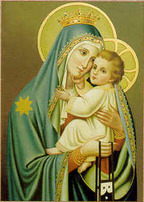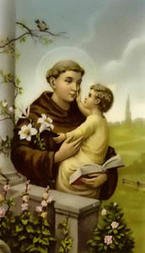Our Patron Saints

Our Lady of Mount Carmel - Feast Day July 16
Mount Carmel was a holy place hundreds of years before Christ. There the prophet Elijah challenged the prophets of the pagan god Baal to a contest where the power of God was shown forth. Later, in the early centuries of Christianity, people who wanted to pray and grow close to God settled on the slopes of Mount Carmel. Scriptures speak of the beauty of Mount Carmel in Galilee. In time a monastery was built there.
In the year 1251, the prior-general of the Carmelites, Simon Stock had a vision of Mary the mother of God. Today became the special feast day of the Carmelite Order. In the 18th century the feast was extended to the whole church. It is celebrated widely in Italy, where people parade through the streets and carry a statue of Mary. Italian Americans have kept up the custom.
Mount Carmel was a holy place hundreds of years before Christ. There the prophet Elijah challenged the prophets of the pagan god Baal to a contest where the power of God was shown forth. Later, in the early centuries of Christianity, people who wanted to pray and grow close to God settled on the slopes of Mount Carmel. Scriptures speak of the beauty of Mount Carmel in Galilee. In time a monastery was built there.
In the year 1251, the prior-general of the Carmelites, Simon Stock had a vision of Mary the mother of God. Today became the special feast day of the Carmelite Order. In the 18th century the feast was extended to the whole church. It is celebrated widely in Italy, where people parade through the streets and carry a statue of Mary. Italian Americans have kept up the custom.

St. Anthony of Padua - Feast Day June 13
Anthony was actually from Portugal, not Italy. His parents were nobles but, instead of a life of luxury, Anthony chose to devote his life to prayer and study. He became an Augustinian priest. After ten years he learned about a new order, the Franciscans, who did missionary work. He wanted to join them and was soon able to arrange it. Francis of Assisi, who founded the Franciscans, was still alive. His spirit of poverty and love fired Anthony's heart.
While in Morocco preaching the gospel, severe illness forced him to sail home. His ship was blown off course and he landed in Italy instead. By chance, Francis had called the friars together there at this very time, so Anthony attended their meeting. Later, after hearing Anthony preach, the friars realized he had a great gift. The wayward ship had steered him to what would become his life's work - preaching throughout Italy and France.
No church could hold the crowds that came to hear him speak. Because of what he said, parents and children made peace with each other; thieves returned what they had stolen; people who told lies admitted them publicly and corrected them. Perhaps this is why Anthony is known as the patron saint of lost items - he worked to find lost people.
He was a humble person who practiced what he preached. So many people experienced the love of God through his work that he became known as a "wonder worker."
Anthony spent the last three years of his life in Padua and died when he was 36 years old.
Anthony was actually from Portugal, not Italy. His parents were nobles but, instead of a life of luxury, Anthony chose to devote his life to prayer and study. He became an Augustinian priest. After ten years he learned about a new order, the Franciscans, who did missionary work. He wanted to join them and was soon able to arrange it. Francis of Assisi, who founded the Franciscans, was still alive. His spirit of poverty and love fired Anthony's heart.
While in Morocco preaching the gospel, severe illness forced him to sail home. His ship was blown off course and he landed in Italy instead. By chance, Francis had called the friars together there at this very time, so Anthony attended their meeting. Later, after hearing Anthony preach, the friars realized he had a great gift. The wayward ship had steered him to what would become his life's work - preaching throughout Italy and France.
No church could hold the crowds that came to hear him speak. Because of what he said, parents and children made peace with each other; thieves returned what they had stolen; people who told lies admitted them publicly and corrected them. Perhaps this is why Anthony is known as the patron saint of lost items - he worked to find lost people.
He was a humble person who practiced what he preached. So many people experienced the love of God through his work that he became known as a "wonder worker."
Anthony spent the last three years of his life in Padua and died when he was 36 years old.
